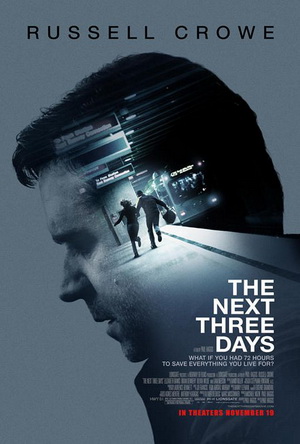
Watching The Next Three Days is a lot like getting bad directions to a party you didn’t want to go to. The further into the trip you are the more lost and frustrated you become, and when you finally get to where you’re going you wonder why you went to begin with.
The film, written and directed by Paul Haggis (Crash), follows the story of John Brennan (Russell Crowe), a Pittsburgh teacher struggling to live with the fact that his wife, Lara (Elizabeth Banks), is in jail for a murder that he believes she did not commit. After he exhausts all appeals to get her out legally, she attempts a botched suicide, and he decides to go outside of the legal process to break her out and make his family whole again.
We must forget that Russell Crowe is a typical action hero and attempt to think that this would be difficult for him. To prepare, he uses a variety of resources that range anywhere from the plausible to the ridiculous. He consults books, watches internet videos on opening locked doors with tennis balls and bump keys, creates one of those ‘man on a mission’ maps of the plan on his bedroom wall, and ponders robbing meth dealers for extra cash. Apparently he ran out of time to watch Prison Break.
He also visits Liam Neeson, a seven-time prison escapee who wrote a book on his escapades and shares some of his insights. Neeson, who seems to have ascended into the roll of Hollywood’s current European badass, brings some genuine fun to this scene, but it’s short lived and quickly disposed of. Neeson’s appearance is symptomatic of the film as a whole. It could’ve been a fun little genre picture, but Haggis is so inflated with self importance that he continually tries to turn it into a wrenching action-drama without much success.
As a director, Haggis is at least competent. The action scenes are solid when they finally happen, and some of the chase sequences are genuinely exciting. The same, however, cannot be said of his writing. It isn’t that it’s all bad; rather, it’s wildly inconsistent. There is a wonderful scene where Crowe tells his imprisoned wife that he’s sold their house, and she tells him that now she has nowhere to picture him and their son when she thinks of them. It feels real, and it reminds us that we’re watching real characters, not just action heroes. But then we get scenes that are so laughably awful that they become almost shameful. Are we really supposed to believe that after all this planning Crowe wouldn’t know where the bullets go in a handgun? Scenes like this make it nearly impossible to believe that that Haggis is responsible for writing not one, but two Best Picture winners. And yet, here they are, and it’s his name on the screenplay.
The movie also deals with a serious length issue. The longer it drones on without the break out taking place, the more annoyed with it we get. Characters are introduced for seemingly no reason other than extending the running time. We get two pairs of useless detectives to serve as makeshift obstacles for Crowe, a half developed father that Crowe shares a bad relationship with, and a complete afterthought of character played by Olivia Wilde, who I suppose was only put on screen to wake dozing audience members.
But the worst problem, without question, is the character of Lara Brennan. It wouldn’t be fair to dump this blame solely on Elizabeth Banks (though she does struggle to truly command the role), but in a film that turns on a husband rescuing his wife from prison, the audience should at least have some feeling of sympathy or connection to her. Haggis has created Lara with all of the wrong traits. The first time we see her on screen she is hopelessly obnoxious, holier-than-though in a way that makes us wonder why Crowe would even sleep next to her, let alone risk his life to free her. It’s hard to root for a man breaking the law for a character that we are either indifferent to or just plain don’t like, but that’s what we’re left with here.
Haggis also makes the mistake of throwing a huge twist into her character arc that completely backfires, leaving us more disengaged from her than we already were. I assume his goal was to reenergize the audience and keep them guessing, but comes off feeling like if Ocean’s 11 had made us think that Clooney and his gang were going to steal all that money and then use it to fund terrorism. We start rooting against her even though we know it might be a trick, because it is a twist used for no other reason than to have a twist, and nobody likes feeling double crossed (I’m looking at you, M. Night Shyamalan).
I truly wish I could go into greater detail about what this does to the movie, but that would require spoilers, and so I must move on and wrap up. I have a good feeling that The Next Three Days was released the same weekend as Harry Potter to provide an intelligent option for those not wrapped up in Potter-mania, but it comes off so preposterous that at some times it might as well be wizardry. For all the time we spend watching Crowe plot their escape, we’re the ones wishing for an exit strategy, as The Next Three Days is truly an imprisoning experience.
A few nice action scenes can’t save The Next Three Days from sloppy writing, shoddy character development, and all around poor construction: C-

One Comment on “‘The Next Three Days’ Review: Haggis Ends Up Eating Crow(e)”